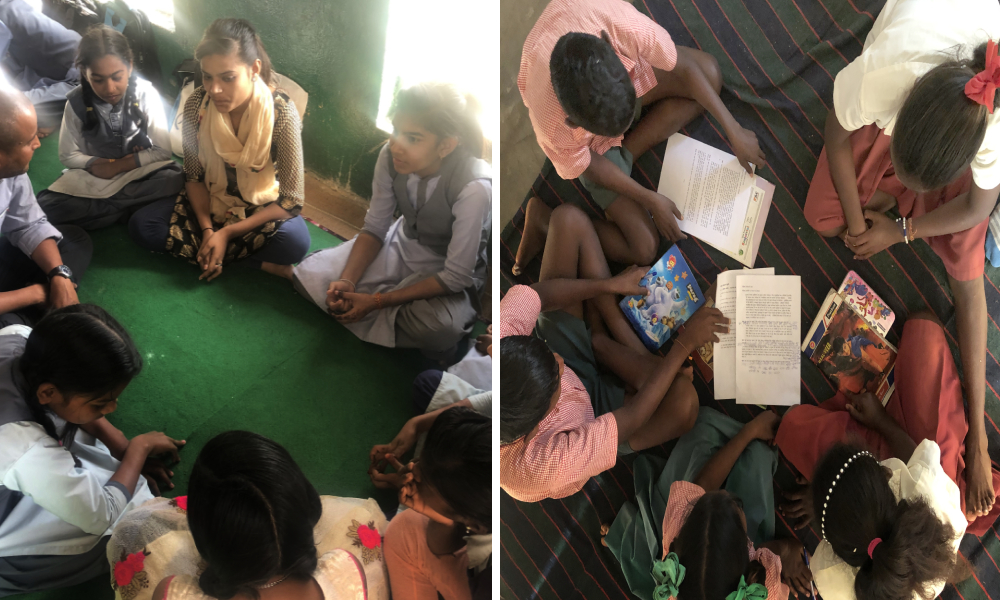
Agency For Decision Making Among Young People – A Key Imperative For Nation Building
India, 29 Aug 2020 9:35 AM GMT | Updated 31 Aug 2020 4:11 PM GMT
Creatives : Abhishek M
" An engineer by profession, Abhishek is the creative producer of the team, graphic designing is his passion and travelling his get away. In more ways than one, he makes the content visually appealing."
Young people do not need us to take decisions for them, but need us to create the space for them to develop the agency to take effective decisions for themselves and their communities.
"The government can keep engaging in these discussions about making the age of marriage 'x' or 'y'... but who is asking the girls? The government must leave this decision up to girls. She is capable of taking this decision wisely. The government just needs to create good opportunities and support services for her, the rest will all fall in place." – Dulali (17).
On August 15, 2020, from the ramparts of the Red Fort, the Prime Minister announced that a committee has been set up to reconsider the minimum age of marriage for girls. India's maternal mortality rate (MMR) is alarmingly high and increasing the age of marriage for girls from 18 to 21 with the intent to delay the age of first conception, seems to be the government's go to plan to "solve the problem" of MMR.
In fact, the said committee has already been meeting and has invited research experts, academics, civil society organisations and legal experts into the discourse. A key stakeholder, whose voices are yet to be fully considered, are the young people of India, who would be most impacted by this decision.
India is currently witnessing a demographic explosion, with 543 million people below the age of 35 years. At the same time, with the advent of communication technology, there is an information explosion, which has drastically reduced the knowledge gap between young people and adults. Young people, are now more aware, opinionated, decisive and aspirational and its time we acknowledge this and go beyond the demographic dividend thinking that permeates the youth discourse today.
On the one hand, we have pinned all our hopes of nation building on our young, and on the other hand, like in the case of the decision on age of marriage, we do not deem it necessary to consider their opinions on a matter that they are directly affected by.
With a vision to amplify young voices and ensure their Right to Decision Making, 96 civil society organizations from 15 states across India initiated a process to understand what young people thought about this proposed change. The variety of responses from 2480 young people (12-22 years), mostly from impoverished rural areas and urban slums, from ST, SC, OBC and minority communities, highlighted their nuanced understanding of the complex issue of marriage as an institution.
A large number pointed out how poverty, lack of options, agency, educational and employment opportunities affect them, making early marriage seem like a viable option to parents and often to young people themselves. They spoke of girls being seen as a burden, a liability and how that impacts their lives. They referred to the criminalisation of consensual sexual relationships of young people, the impact COVID is having on their lives – and what needs to be done to support them at these times.
The common thread emerging was young people's lack of choices and ability to make aspirations and decisions on matters which impact their lives- marriage, relationships, education and career spaces.
Young people were vocal that investment in creation of incentives: quality, safe and economical education; skills development that translate into secure employment and; access to information and services for contraception and safe abortions would be more effective than the pressure (if any) created by law. At a time when COVID-19 is reducing aspirations and agency of young people by cutting them off from opportunities and throwing their families into economic crises their wish is that government efforts are channelised on poverty eradication and restarting opportunities for them rather than in changing laws. Underlying all this is the desire to be taken seriously by their families, community leaders and the government itself and to have the confidence to share and act on their decisions.
What these young people have reminded us, is that they do not need us to take decisions for them, but need us to create the space for them to develop the agency to take effective decisions for themselves and their communities.
With this in mind, the vartaLeap coalition has initiated #GenNationBuilding: Youth Rights and Duties Draft Declaration. Society has placed the massive responsibility of nation building on our young people. However, this duty can only be accomplished if the young can have agency, take important decisions and reach their own potential, even as they make change in the world. This campaign seeks to engage young people, parents, communities, educators, institutions, employers, corporates, media houses, UN Agencies, civil society organisations and others in a collaborative dialogue to co-create the right space, context and narrative for the youth of this country. What young people need is a seat at the table, a voice and have that voice be heard – every family, every classroom, every work-space, every panchayat, our parliaments and our cabinet.
Written with excerpts from the Young Voices - National Report by the Young Voices National Working Group.
Also Read: How 15-Yr-Old Chandni From Bihar Prevented Her Own Child Marriage & Stopped Three More
 All section
All section














